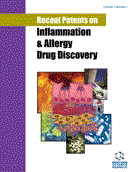Abstract
Atopic dermatitis is one of the most prevalent chronic eczematous inflammatory skin diseases in westernized populations. It is caused by both skin barrier dysfunction and abnormal immunologic response. An imbalance of effector T cells and regulatory T cells is a crucial factor in the initiation of allergic diseases. Recent advances in immunology have revealed the role of regulatory T cells in atopic dermatitis. Treatment of atopic dermatitis consists of restoring and maintaining a sufficient skin barrier and inducing a balanced systemic immune response.
Keywords: Regulatory T cells, atopic dermatitis
Recent Patents on Inflammation & Allergy Drug Discovery
Title: Regulatory T Cells in Atopic Dermatitis
Volume: 4 Issue: 3
Author(s): Naoki Oiso
Affiliation:
Keywords: Regulatory T cells, atopic dermatitis
Abstract: Atopic dermatitis is one of the most prevalent chronic eczematous inflammatory skin diseases in westernized populations. It is caused by both skin barrier dysfunction and abnormal immunologic response. An imbalance of effector T cells and regulatory T cells is a crucial factor in the initiation of allergic diseases. Recent advances in immunology have revealed the role of regulatory T cells in atopic dermatitis. Treatment of atopic dermatitis consists of restoring and maintaining a sufficient skin barrier and inducing a balanced systemic immune response.
Export Options
About this article
Cite this article as:
Oiso Naoki, Regulatory T Cells in Atopic Dermatitis, Recent Patents on Inflammation & Allergy Drug Discovery 2010; 4 (3) . https://dx.doi.org/10.2174/187221310793564227
| DOI https://dx.doi.org/10.2174/187221310793564227 |
Print ISSN 1872-213X |
| Publisher Name Bentham Science Publisher |
Online ISSN 2212-2710 |
 8
8Related Articles
-
The Effect of Proprotein Convertase Subtilisin-Kexin Type 9 and its Inhibition on Glucose Metabolism and Cardiovascular Risk. We Should do Better the Second Time After Statins
Current Pharmaceutical Design Reliability of Blood Pressure Patterns Defined by a Single 24-Hour Ambulatory Blood Pressure Monitoring: The Case of the Dipping/Non Dipping and Isolated Clinic Hypertension
Current Hypertension Reviews Embryonic Stem Cells: Overcoming the Immunological Barriers to Cell Replacement Therapy
Current Stem Cell Research & Therapy OX40:OX40L Axis: Emerging Targets for Immunotherapy of Human Disease
Current Immunology Reviews (Discontinued) Editorial [Concurrent Blood Pressure, Glycemic and Lipid Control for the Prevention of Vascular Complications of Type II Diabetes Mellitus: A Long Overdue Objective?]
Current Vascular Pharmacology Autoimmune Channelopathies of the Nervous System
Current Neuropharmacology Clinical Use of Intracoronary Gene Transfer of Fibroblast Growth Factor for Coronary Artery Disease
Current Gene Therapy Novel Vitreous Modulators for Pharmacologic Vitreolysis in the Treatment of Diabetic Retinopathy
Current Pharmaceutical Biotechnology Socio-economic Aspects of Alzheimer's Disease
Current Alzheimer Research Socioeconomic Position and Type 2 Diabetes Mellitus in Europe 1999- 2009: a Panorama of Inequalities
Current Diabetes Reviews An Updated Review for the Diabetic Wound Healing Systems
Current Drug Targets Bio-Antioxidants – A Chemical Base of Their Antioxidant Activity and Beneficial Effect on Human Health
Current Medicinal Chemistry Chronic Latent Magnesium Deficiency in Obesity Decreases Positive Effects of Vitamin D on Cardiometabolic Risk Indicators
Current Vascular Pharmacology Genomics and Natural Products: Role of Bioinformatics and Recent Patents
Recent Patents on Biotechnology Comparison of Artemisia annua Bioactivities between Traditional Medicine and Chemical Extracts
Current Bioactive Compounds Stress, Cardiovascular Diseases and Surgery-Induced Angiogenesis
Current Angiogenesis (Discontinued) The Anti-Inflammatory Potential of ACE2/Angiotensin-(1-7)/Mas Receptor Axis: Evidence from Basic and Clinical Research
Current Drug Targets Blood Pressure and Vascular Alterations with Growth in Childhood
Current Pharmaceutical Design Using Metformin in Pregnancy for Different Indications: Are We Any Wiser now?
Applied Clinical Research, Clinical Trials and Regulatory Affairs Distinct Modulation of Wild-Type and Selective Gene Mutated Vitamin D Receptor by Essential Polyunsaturated Fatty Acids
Mini-Reviews in Medicinal Chemistry



















